Ubuntu 20.04 is available to download now. Take a look at the new features Ubuntu 20.04 LTS brings.
Ubuntu 20.04 codenamed Focal Fossa is now available. Excited about Ubuntu 20.04? Let’s see what new changes this long term support release brings.
New features in Ubuntu 20.04 Focal Fossa
Since it’s an LTS release, stability is of the upmost importance. Canonical team is not going to try any radical changes here.
Ubuntu 18.04 LTS users would surely notice the visual changes and performance improvements but I don’t think you’ll see many changes between 19.10 and 20.04.
1. More default theme variants and the aubergine touch
Canonical is experimenting with themes again. In Ubuntu 19.10, the default Yaru theme introduced a dark version. Ubuntu 20.04 takes it further three variants of the default Yaru theme: Light, Dark and Standard.
You don’t even need to install GNOME Tweaks to switch between the default theme variants. This option is embedded into the Settings application.
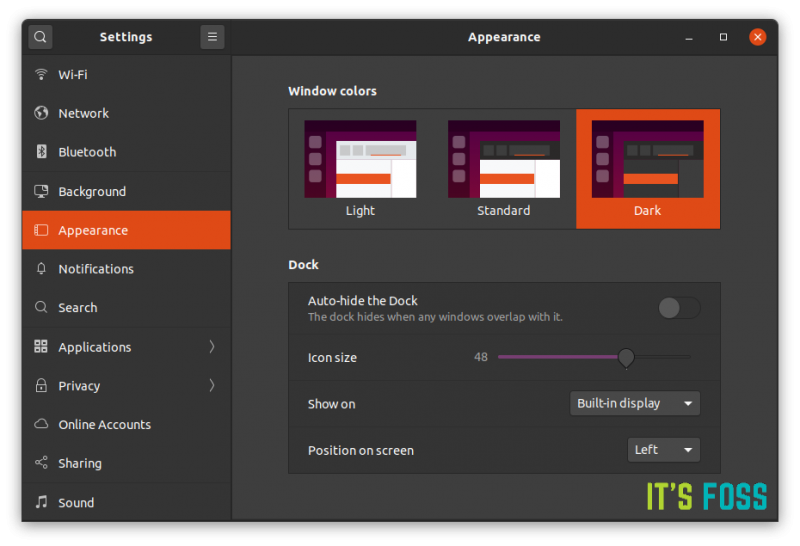
Ubuntu 20.04 also has slightly different look with emphasis on aubergine as second accent color (instead of the regular blue and green).
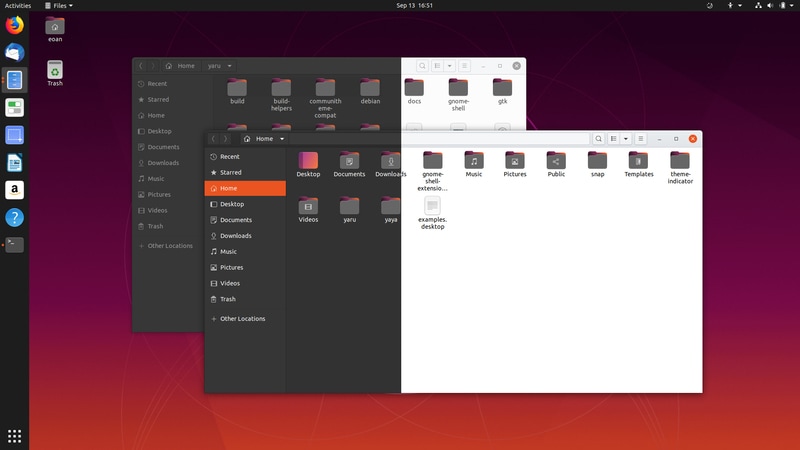
2. GNOME 3.36 and all the visual and performance improvements that come with it
Ubuntu 20.04 has the latest GNOME 3.36 release. This means that all the new features in 3.36 are also available for Ubuntu 20.04.
For example, you’ll notice a revamped lock screen.

The one more good thing is that now you don’t need to scroll down to go to the lock screen anymore. A single click and you’ll be on the login screen.
3. Disable all desktop notification with ‘Do Not Disturb’ button
Getting distracted by desktop notifications? You can utilize the ‘do not disturb’ option to toggle the desktop notifications.
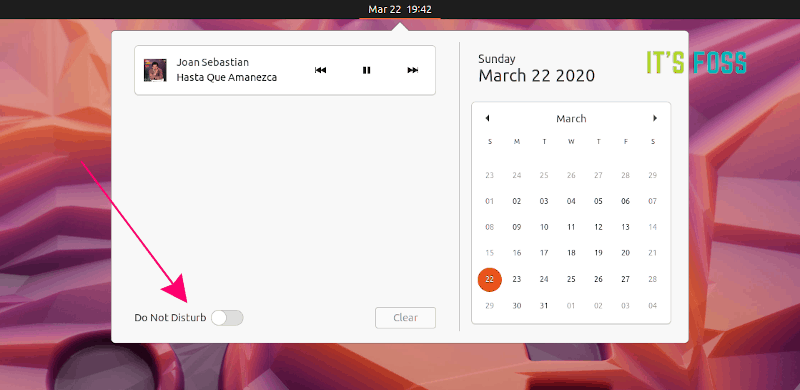
4. Fractional scaling
Ubuntu finally brings fractional scaling. If you always found that icons at 100% looked too small and bit too big at 200%, you can take advantage of the fractional scaling.
When enabled, you can set the scaling to 125, 150, 175 and 200.
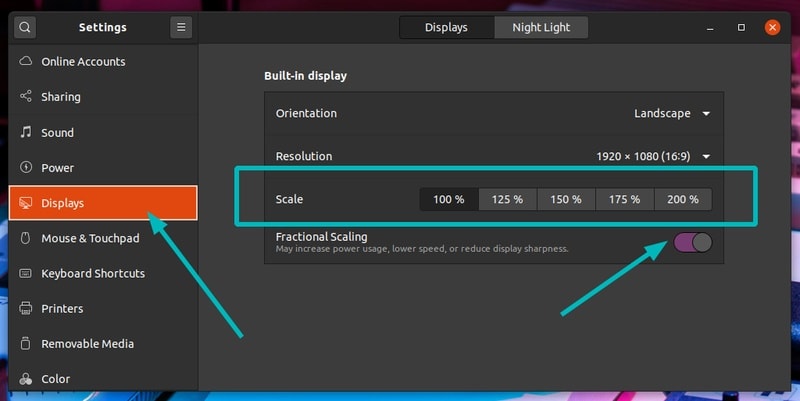
The fractional scaling didn’t work for my multiple monitor setup though. It showed hardware limitation error.
5. Don’t like the dock? You can finally get rid of it
I have come across a few people who don’t like the launcher or the dock with application shortcuts which is usually found in the left side of the screen.
In older versions, you can change its location to bottom or right side or hide it when an application window approached it but you could not hide it permanently.
If you never liked the dock, you can now disable it completely. There is a new application, unsurprisingly called Extensions, to manage extensions and you can use it to disable the dock completely.
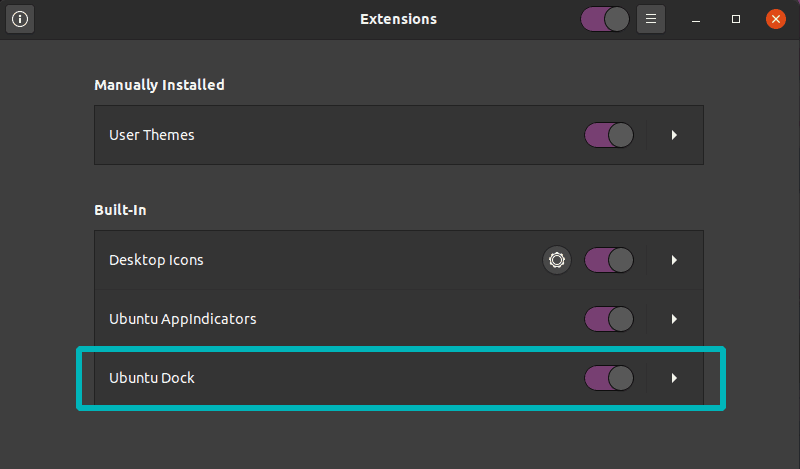
6. Snaps before apts
Canonical keeps on pushing its universal packaging format snap. It is even more evident in Ubuntu 20.04 release. If you try to run a program that is not installed, earlier it used to suggest apt command for installing it.
But now it suggests both snap and apt commands with snap command suggestion before apt.
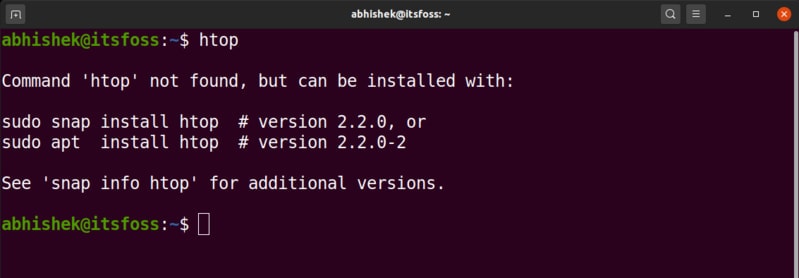
7. Linux Kernel 5.4
Ubuntu 20.04 features the latest LTS kernel 5.4. This means that you get native ExFAT support and all the other performance improvements and new hardware supports that come with it.
8. Faster install, faster boot
Thanks to the new compression algorithms, it now takes less time to install Ubuntu 20.04. Not only that, Ubuntu 20.04 also boots faster in comparison to 18.04.
I used systemd-analyze to check the boot time in both versions.
9. Improved ZFS support
Ubuntu became the first mainstream Linux distribution to introduce ZFS as root with Ubuntu 19.10 release.
While Linus Torvalds may not like ZFS, it is still a popular file system. Ubuntu 20.04 sees improved support for ZFS.
10. No Amazon app, no python 2
For past eight years or so, Ubuntu included an Amazon app installed by default. This so-called Amazon app did nothing but open Amazon website of your country (if there is one) in a web browser with Ubuntu’s affiliate link. The Amazon shopping app disappears from Ubuntu 20.04.

Python 2 was first release in 2000. After twenty years, Python 2 has finally reached end of life. Ubuntu 20.04 won’t support Python 2 anymore and you’ll have to content yourself with Python 3.
11. WireGuard VPN specially backported
Though Ubuntu 20.04 won’t be using kernel 5.6 at least immediately, it is backporting WireGuard in kernel 5.4.
WireGuard is the new buzz in VPN industry and thus including WireGuard in its kernel should give some boost to Ubuntu 20.04 in the cloud scenario.
12. No 32-bit systems for Ubuntu 20.04
Ubuntu is not providing ISO for 32-bit computers for a few years now. But at least existing 32-bit Ubuntu users could still upgrade to Ubuntu 18.04.
That’s not the case anymore. You cannot upgrade to Ubuntu 20.04 if you are using 32-bit Ubuntu 18.04. If you try to run the upgrade, you’ll see an error of this kind.
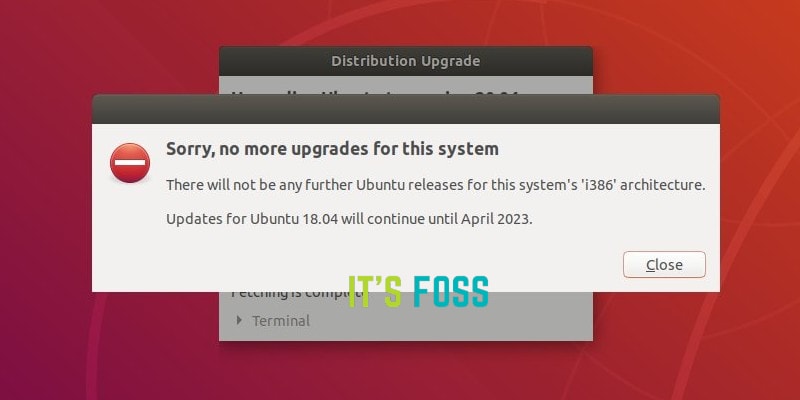
In other words, if you are using 32-bit Ubuntu 18.04, you’ll have to stay with it till April 2023.
13. Under the hood improvements
There are a few under the hood improvements:
- GNOME 3.36 is less resource hungry and it feels sleek and light to use
- There are improvements to Thunderbolt support
- Most of the software have been upgraded to newer version
- You’ll get NVIDIA drivers on the ISO itself
I have shown some of the above mentioned features in this video. See them in action:
Things you should know about Ubuntu 20.04
Ubuntu 20.04 is a LTS (long term support) release. It will be supported for five years. This means if you use 20.04, you can use it till April, 2025 without needing to upgrade your computer to a new Ubuntu release.
Enterprise clients can buy the extended support maintenance for five more years.
If you are using Ubuntu 18.04 or Ubuntu 19.10, you’ll be able to upgrade to Ubuntu 20.04 from within your system.
If you are using Ubuntu 16.04, you would need to upgrade to Ubuntu 18.04 first and then upgrade to 20.04.
You can follow this article to get answers to some of the frequently asked questions about Ubuntu 20.04.
Download Ubuntu 20.04 LTS Focal Fossa
Ubuntu 20.04 LTS is releasing this evening (UK time). The ISO will be officially available in a couple of hours.
If you really don’t want to wait, you can download the daily build ISO. It’s almost the same as the final ISO. Download and install from it. Keep your system updated and you’ll be at the same as level as the final stable release.
Which feature do you like the most in Ubuntu 20.04 LTS release? Do share it with the rest of us. And if you just installed it, don’t forget to check the list of things to do after installing Ubuntu 20.04.
[interaction id=”5ea129d49fea4b69f305fdd1″]

